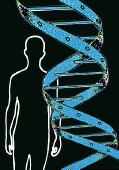 |
 |
 |
||
    |
||||
|
||||

Genetic Mutations Linked to Deadly Brain Cancer
Tests could one day individualize treatment, researcher says|
|
HealthDay
Wednesday, February 18, 2009
 WEDNESDAY, Feb. 18 (HealthDay News) -- Researchers report that they've discovered two genetic mutations that play an important role in the development of some particularly dangerous types of brain tumors.
WEDNESDAY, Feb. 18 (HealthDay News) -- Researchers report that they've discovered two genetic mutations that play an important role in the development of some particularly dangerous types of brain tumors.
The findings "open a completely new avenue" to better treatments for one of the most deadly forms of cancer, said Dr. Hai Yan, lead author of a study published in the Feb. 19 issue of the New England Journal of Medicine.
For the moment, the research doesn't appear likely to result in immediate benefits for patients. But ultimately, it may allow physicians to "understand what kind of tumor patients have and give them the right treatment," said Yan, an assistant professor of pathology at Duke University, in Durham, N.C.
At issue are brain tumors known as gliomas. About 10,000 Americans are diagnosed with the tumors each year -- the most famous current patient is Senator Edward Kennedy -- and the prognosis is grim. While the cancer typically doesn't spread to other parts of the body, it can create havoc in the brain and cause death within months.
The tumors are hard to treat. Chemotherapy and radiation can damage healthy brain tissue and only allow patients to live a few months longer. The only effective drug appears to extend lifespan for just a couple of months, Yan said.
Surgery is an option, but "gliomas generally spread in the brain the way roots spread from a plant," Yan said. "It is very difficult to completely remove the tumors."
In the new study, Yan and colleagues found that two genetic mutations appear in more than 70 percent of certain kinds of these tumors.
"You could use these genes to distinguish a subtype of glioma," Yan said. "Two tumors may look like a duck and walk like a duck, but the two tumors may be quite different."
Once a test determines the type of a glioma in a patient, doctors could conceivably choose from an array of treatments. "You can give one kind of patients one kind of drug, and others another kind of drug," Yan said.
That kind of tailored treatment awaits on the horizon. But for the time being, a genetic test that costs less than $100 could provide information to patients about their prognosis by revealing the type of tumor they have, Yan said.
The results are promising because they reveal that there two distinct types of tumor, said Dr. Craig Thompson, chairman of the University of Pennsylvania's Department of Cancer Biology and Medicine.
"They are caused by different mutations and therefore are likely to respond to different therapies," said Thompson, who wrote a commentary accompanying the study. "Before this, we did not know what caused these tumors."
HealthDay
Copyright (c) 2009 ScoutNews, LLC. All rights reserved.
Related News:
More News on this Date
Related MedlinePlus Pages:
| Home | Health Topics | Drugs & Supplements | Encyclopedia | Dictionary | News | Directories | Other Resources | |
| Disclaimers | Copyright | Privacy | Accessibility | Quality Guidelines U.S. National Library of Medicine, 8600 Rockville Pike, Bethesda, MD 20894 National Institutes of Health | Department of Health & Human Services |
Date last updated: 19 February 2009 |
